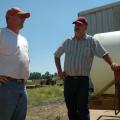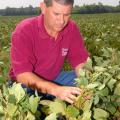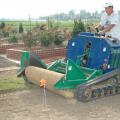News From 2006
MISSISSIPPI STATE -- A year after Hurricane Katrina turned thousands of lives upside down in South Mississippi, the Extension Service is still working to help residents get their lives back to normal.
In May, train-the-trainer sessions were started to equip volunteers in five coastal counties with new ways to help those still struggling. The Mississippi State University Extension Service received a U.S. Department of Agriculture Communities Caring for Families grant of more than $111,000 to do this work.
MISSISSIPPI STATE -- The long-awaited, state-of-the-art Mississippi Veterinary Research and Diagnostic Laboratory in Pearl opened its doors Aug. 14 to provide quicker diagnostics on samples from a broad range of animal species.
MISSISSIPPI STATE -- Biodiesel will be the subject of an Aug. 24 workshop at the Bost Conference Center at Mississippi State University.
A renewable fuel produced from vegetable oils or animal fats, biodiesel is being blended with traditional petroleum diesel and sold at an increasing number of retail pumps nationwide. Biodiesel production increased from 500,000 gallons a year in 1999 to about 80 million gallons in 2005. The 2006 output is expected to total more than 200 million gallons.
MISSISSIPPI STATE -- Cotton across Mississippi is faring better than most of the other row crops, but it is struggling here and nationwide because of heat and drought.
Tom Barber, cotton specialist with the Mississippi State University Extension Service, said cotton yields will be down and quality will be lower than normal this year.
“About 32 percent of our crop is in the poor to very poor category because of the droughty conditions,” Barber said.
Much of the state's cotton is shorter than usual, which typically limits yield potential.
MISSISSIPPI STATE -- Most farm children go to college seeking careers away from the hard work and uncertain futures their parents faced, but an elite group in Yalobusha County returned to their communities because they knew “there's no place like home.”
Their efforts have earned state, regional and national recognition, but their greatest satisfaction comes from friendships formed in common toils and successful crops.
By Norman Winter
MSU Horticulturist
Central Mississippi Research & Extension Center
Most of us are fed up with the heat. Thank goodness I have paid better attention to watering and fertilizing this year, and it has paid dividends. My flowers for the most part are still looking doggone good, including the petunias.
If your garden, on the other hand, has that barely alive look, then you may want to start thinking about a late-summer planting of marigolds or zinnias.
MISSISSIPPI STATE -- Millions of ducks and geese depend on waste rice -- grain that escapes combines during harvest -- as a rich source of energy while wintering in major rice-growing states such as Arkansas, California, Louisiana, Mississippi, Missouri and Texas.
By Chance McDavid
MISSISSIPPI STATE -- A group chartered by the U.S. Congress is encouraging Mississippians to respond to interim health-care recommendations during upcoming forums in Jackson, Hattiesburg and Greenville.
Congress set up the Citizens' Health Care Working Group to engage the public in a national discussion of options to improve the national health-care system.
MISSISSIPPI STATE -- Asian soybean rust has made its first 2006 appearance in Mississippi soybean fields, but it's probably arrived too late to have much, if any, impact on the crop.
Rust was found in south Mississippi on Aug. 1, said Mississippi State University Extension Service soybean specialist Alan Blaine.
By Norman Winter
MSU Horticulturist
Central Mississippi Research & Extension Center
The new ginger known as Emperor has caused quite a commotion at my house. Everyone loves it.
First, let me admit I have never been a huge fan of variegated plants. There are some cannas, hostas and tropical crotons that have captured my heart, but this ginger took me by surprise.
Emperor is a variegated form of the hidden ginger and is known botanically as Curcuma petiolata. It has dark green leaves with creamy yellow variegation on the margins.
By Keryn B. Page
MISSISSIPPI STATE -- Dry summer weather may make some people think they don't need to worry about mosquito-borne diseases, but experts say to keep up the defenses against West Nile virus.
Entomologist Blake Layton with the Mississippi State University Extension Service said the Southern house mosquito is the main carrier of West Nile virus. He said this mosquito breeds in stagnant water and containers and doesn't require much water to quickly increase in number.
BILOXI -- Milh Lu sat on the deck of his boat in Biloxi's back bay amid a pile of mostly-spoiled shrimp. Both Lu and his catch were victims of one of the many problems facing Gulf Coast shrimp fishermen this year.
“Not enough ice,” Lu said. “I did not have enough ice to keep part of the catch fresh enough to sell.”
Lu operates an “ice boat,” a ship that can spend several days harvesting shrimp while keeping its catch fresh in ice-filled compartments below the deck. The shrimp are sold to processing plants.
MISSISSIPPI STATE -- Garden crops in Hurricane Katrina storm surge areas should be safe for consumption if washed properly.
Larry Oldham, soils specialist with Mississippi State University’s Extension Service, said Gulf Coast Extension Service offices are getting calls about the safety of vegetables following reports of high arsenic levels in the Katrina-affected area.
MISSISSIPPI STATE -- Country music legend Willie Nelson and biological engineer San Fernando have a lot in common.
The common link between the singer and the Mississippi State University professor is biodiesel, a fuel for diesel engines produced by blending petroleum diesel with refined vegetable oil. Nelson is promoting biodiesel as an alternative to pure petroleum-based diesel and as a way to support U.S. farmers. Fernando is researching ways to make production of the fuel easier and more cost-effective.
MISSISSIPPI STATE -- Mississippi's sod producers are experiencing significantly higher production and transportation costs with little opportunity to pass their expenses on to consumers.
Wayne Wells, turfgrass specialist with Mississippi State University's Extension Service, said the cost of fuel impacts the cost of nitrogen fertilizer, which requires natural gas for production.
MISSISSIPPI STATE – An Aug. 7 videoconference will address the impact of the ongoing drought and cattle producers’ concerns about finding ample feed sources for the upcoming fall and winter.
The statewide distance education meeting for producers will begin at 7 p.m. Viewing sites around the state are being arranged. Contact the local Extension office for the nearest location.
By Norman Winter
MSU Horticulturist
Central Mississippi Research & Extension Center
Foliage can be as effective as flowers, or more effective in some cases, in providing colorful beauty the entire season. Flowers cycle though the season, but when beautiful foliage is in the mix, the garden will always look exceptional.
By Keryn B. Page
Ag Communications
MISSISSIPPI STATE -- On June 23, it had been 7 long months since Navlean Pittman had seen her son, and she felt like hugging the television.
Pittman was one of the first two Mississippians to take part in a Freedom Call, which connects soldiers serving in Iraq to their families back home through videoconferencing technology. Interactive videoconferencing allows people in different locations to see and talk to each other over a television in real time, just as though they were face to face.
MISSISSIPPI STATE -- Tree losses in South Mississippi from Hurricane Katrina are still rising 11 months and counting after the devastating storm made landfall.
Glenn Hughes, Mississippi State University Extension Service forestry specialist in Lamar County, said the extent of the damage is still being assessed and more trees continue dying from affects of the storm.
MISSISSIPPI STATE -- Mississippi farmers are in the same boat as most cattle producers across the country, and there is no water around any of them.
Pages
News Types
- Crop Report (424)
- Feature Story (5879)
- Feature Photo (53)
- Extension Outdoors (318)
- Southern Gardening (1452)
- Extension Inbox (95)
Archive
- 2024 (189)
- 2023 (182)
- 2022 (187)
- 2021 (177)
- 2020 (212)
- 2019 (223)
- 2018 (276)
- 2017 (338)
- 2016 (383)
- 2015 (457)
- 2014 (498)
- 2013 (490)
- 2012 (492)
- 2011 (356)
- 2010 (323)
- 2009 (313)
- 2008 (273)
- 2007 (263)
- 2006 (252)
- 2005 (278)
- 2004 (273)
- 2003 (279)
- 2002 (228)
- 2001 (238)
- 2000 (243)
- 1999 (233)
- 1998 (232)
- 1997 (239)
- 1996 (58)
- 1995 (36)







